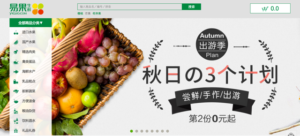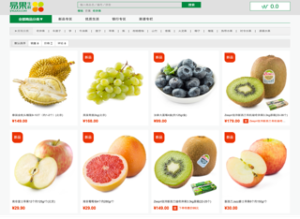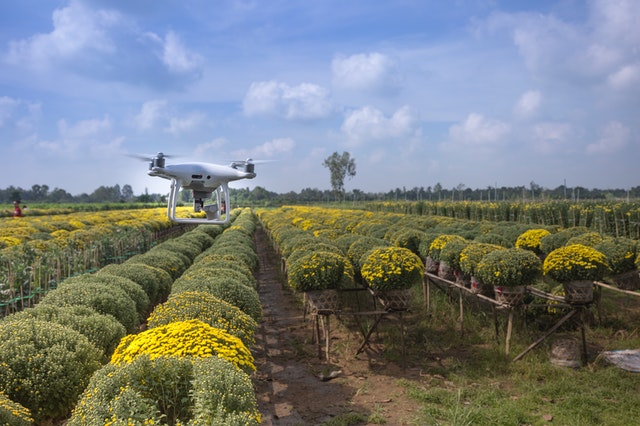As reported by the Internet Retailer, total online retail sales in China reached ¥3.877 trillion ($589.61 billion) in 2015, a growth of 33.3% from 2014, according to data released by the National Bureau of Statistics i n China. Since 2013, China is the world’s largest e-retail market. The iResearch’s Fresh Food in E-Commerce in China shows that Fresh food in China e-commerce market has been growing robustly in recent years. Fresh food in China online sales reached 49.71 billion yuan in 2015. Nevertheless, it only accounts for 3.4% of total retail sales of agricultural products, which implies huge room for growth in the future. The market is estimated to exceed 100 billion by 2017.
n China. Since 2013, China is the world’s largest e-retail market. The iResearch’s Fresh Food in E-Commerce in China shows that Fresh food in China e-commerce market has been growing robustly in recent years. Fresh food in China online sales reached 49.71 billion yuan in 2015. Nevertheless, it only accounts for 3.4% of total retail sales of agricultural products, which implies huge room for growth in the future. The market is estimated to exceed 100 billion by 2017.
Due to serious pollution and frequent food safety scandals, consumers have placed higher requirements on the quality, safety, and convenience of food. An increasing number of consumers, willing to pay more for reliable food, started to purchase imported products online, especially in the fresh food category which includes vegetables and fruits, meat and eggs, milk and dairy products, aquatics products and seafood and cooked food and pastries. According to iResearch, 53.1% of Chinese consumers purchased imported fresh food online in 2015. The top 3 best-selling fresh food categories purchased online were fruits, milk & dairy products and meat. Vegetables, as a major fresh food category, only constituted a small percentage of online fresh food purchases. In contrast, small output and heavy demand have driven up imports of dairy products, making it a popular fresh food category purchased online.
Why online fresh food in China shopping is booming
First of all, China’s rapid urbanization leads to a continuous growth of urban population, enhancing affordability and the density that enables economy of scale in delivery. Moreover, the Chinese middle-class is becoming wealthier with a yearly disposable income growing fast: there are now around 225 million households with an annual income of 75,000-280,000 yuan ($11,500-43,000). Food safety concerns boosted demand for imported fresh food. Among internet users who bought fresh food products online in 2015, they were 38% to declare buying online to get imported products and 26.6% to get organic products. Wealthy Chinese customers are more and more willing to pay a premium for healthy organic food, traceable food sources and appropriate processing. But the quality was not the main driver for online purchase of fresh food. As consumers get richer with a busier schedule, they pay more attention to time efficiency rather quality. Indeed, according to iResearch, Chinese consumers were only 29.7% to consider the quality of fresh food e-commerce as higher than in offline supermarkets and markets. The three main reasons for buying fresh food online were to save time of shopping in supermarkets (65.6%), to save money –online prices are typically 10 to 20 percent lower than in-store- (59.8%), and to have access to a more diversified range of products (44%).
Fast-growing demand for online fresh food in China improved the timeliness of delivery
B2C (business-to-consumer) online fresh food delivery is quite different from traditional e-commerce. Fresh food in China has much higher logistics requirements to ensure product quality, especially when it comes to delivering all across China. It must be stored and transported under strict temperature with shortest delivery time, to ensure product freshness. According to iResearch, over two-thirds of fresh food orders in 2015 reached Chinese consumers within two days.
Chinese consumers’ huge preference for imported fresh fruits makes fresh food e-commerce market very attractive for overseas importers, but also represents a big challenge in terms of logistic. China became Chile’s biggest cherry export destination, and Chinese customers purchased about 84% of total Chilean cherries in 2015. Chinese financial media Hexun.com reports that China’s total value of imported fruits first time exceeded $5 billion in 2015. A questionnaire also showed that Chinese consumers spend twice as much online than offline fresh food shopping on average, and 51% of online fresh food purchases are fruits.
Current solutions for fresh food delivery existing in China
In order to satisfy consumers’ demand, Chinese e-commerce companies provide a large amount of imported fresh products. Two major challenges for them are to ensure product freshness and fast delivery. Yiguo.com is a Chinese online fresh food delivery company. It was built in 2005, which was the earliest player in China. To meet Chinese customers’ demand, Yiguo.com seeks for a relationship with suppliers and farms in different countries, directly imports fruits to China, and distributes products by its own efficient cold chain logistic system. With rapidly growing demand and development of logistic systems in China, Yiguo.com also expands its cooperative relationship with more suppliers and outsources some deliveries to third party logistics. Currently, Yiguo.com imports fresh food in 22 countries and distributes to 310 Chinese cities.
 Not all companies like Yiguo.com have capital and resources to build own logistics network. Rapid developing logistics system makes it much easier for small and medium-sized fresh food e-commerce companies in China. With its huge network and financial resources, the Chinese e-commerce giant Alibaba Group collaborated with major logistics companies in China, including warehouses and cross-border delivery firms, and established Cainiao Network in 2013. This network reallocates and integrates logistics resources in China, and provides a real-time data-sharing platform. It helps delivery companies and e-commerce related businesses improve logistics efficiency and reduce costs, especially e-commerce has stricter delivery requirements. Cainiao Network established cold chain logistics and warehouses, which can deliver fresh food to 36 major cities in China in 24 hours. Nine online fresh delivery companies including Yiguo.com now cooperate with Cainiao (https://www.cainiao.com/markets/cnwww/store-distribution-detail).
Not all companies like Yiguo.com have capital and resources to build own logistics network. Rapid developing logistics system makes it much easier for small and medium-sized fresh food e-commerce companies in China. With its huge network and financial resources, the Chinese e-commerce giant Alibaba Group collaborated with major logistics companies in China, including warehouses and cross-border delivery firms, and established Cainiao Network in 2013. This network reallocates and integrates logistics resources in China, and provides a real-time data-sharing platform. It helps delivery companies and e-commerce related businesses improve logistics efficiency and reduce costs, especially e-commerce has stricter delivery requirements. Cainiao Network established cold chain logistics and warehouses, which can deliver fresh food to 36 major cities in China in 24 hours. Nine online fresh delivery companies including Yiguo.com now cooperate with Cainiao (https://www.cainiao.com/markets/cnwww/store-distribution-detail).
JD.com, the biggest self-operated online retailer in China, provides another solution. JD.com established fresh food bonded warehouses in Guangzhou in 2016. Fresh products can be sent directly from companies and farms abroad to the warehouse, and quarantined in the warehouse, then distributed by JD.com. This logistics system can achieve “Farm to table” within four days, which ensures products are fresh enough when consumers receive them.
See also our service: Online market research China
Stay Updated! Follow us on Facebook:





